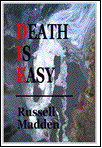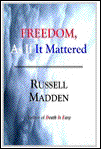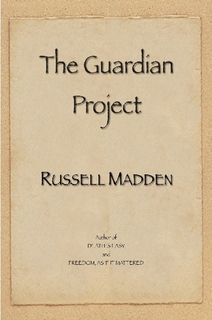-

|

|  | 
|
-
- DEATH IS
EASY
- by
- Russell
Madden
-

- Softcover,
$14.95

- Hardcover,
$24.95
-
-
- (Preview. Also available in a
digital
edition, $4.81.)
|
- FREEDOM,
-
As If
- It Mattered
- by
- Russell Madden
-

- Softcover,
$24.95

- Hardcover,
$34.95
-
- (Preview. Also available in a
digital
edition, $5.63.)
|
The Guardian Project
- by
- Russell Madden

Softcover,
$14.95
Digital Edition, $4.95
Preview available.
|
RaNdoM
- by
- Russell Madden
Softcover,
$14.95
Digital Edition, $4.95
Preview available.
|
HOPING FOR “WHAT
IF...”:
A REVIEW OF
HOPE
by
Russell Madden
Hope, Aaron Zelman and L. Neil Smith. Mazel
Freedom Press, 2001, 431 pages, $10.95.
Take an ultra-rich and dedicated libertarian, a
set of possible but unlikely coincidences, and you have the
foundation for Aaron Zelman and L. Neil Smith’s most recent
collaboration, Hope. The subtitle for this novel reveals the theme of the
story: “How would you feel if you no longer feared your
government?”
Hope is an
indirect sequel to Zelman and Smith’s 1999 book, The Mitzvah, a much
shorter and smaller scale tale. Hope details the
transformation of the wealthy Alexander Hope from tech mogul to
self-financed college history instructor to presidential candidate
for the “Free Libertarian Party of America” and eventually to
unexpected leader of the United States.
A scandal involving the Republican (Socialist
Party A) presidential candidate and an automobile accident befalling
the Democratic (Socialist Party B) candidate (a woman bearing an
uncanny resemblance to the wife of a certain ex-President and, in
2008, a senator from New York) dispirits even more American voters
than usual. As the saying goes, on election day, they stay home in
droves. The replacement candidates opposing Hope are pitifully
inadequate to the task. Surprising even him, Hope awakes to find
himself the president-elect.
Much of the action in this story flows from
what has become a mantra of L. Neil Smith: strict enforcement of the
Bill of Rights. Smith may personally have reservations regarding the
validity of any government. In Hope, however, he and
Zelman operate from the assumption that any likely changes to the
political reality in America will, for the foreseeable future, have
to occur within the framework of the Constitution.
Zelman and Smith couple the power of an actual
respect for and adherence to our Constitution and its Bill of Rights
with another tool long available for political change: jury
nullification. Unfortunately, this impediment to State expansion has
largely vanished down the rabbit-hole of current judicial practices.
Jury nullification is presently “discredited” by the majority of
judges, lawyers, and politicians. This practice — championed today
by the Fully Informed Jury Association (FIJA) — acknowledges that
the ultimate source and authority for anything the State
(legitimately) does arises from individual citizens.
In their capacity as jurists, it is not only
citizens’ right but their obligation to judge not only the particular
facts involved in a given case but also the law upon which the
charges are based. While jurists cannot repeal a piece of
legislation, they can, however, work to diminish, i.e., nullify, the
negative effects of laws that violate individual rights by refusing
to convict people brought to trial in violation of such
unconstitutional laws.
Government of the people, by the people, and
for the people means little today in terms of the ultimate source of
law, i.e., individual rights in a social context. Such ideas have
degenerated into an almost total democracy, a tyranny in which the
majority runs roughshod over the lives and property of anyone in
disfavor. Zelman and Smith’s vision of proper justice would restore
control to “the people.”
Despite the fact that such tactics are readily
available right now, Hope in many respects
reads like a fantasy. Because the majority of the American populace
is addicted to big government and dutifully and silently performs the
actions demanded of the people by the State — such as paying taxes,
surrendering weapons, and obeying destructive regulations and
laws — the notion that a significant proportion of the electorate
would willfully and gladly wield the tool of jury nullification to
impede the progress of the State strikes me as fanciful; an extremely
appealing dream, true, but not one likely to occur anytime
soon.
I sincerely “hope” I am proved dead wrong. If
Americans reclaimed their heritage in a U.S. version of the fall of
the Berlin Wall, I would rejoice while happily admitting my abysmal
error.
Another, perhaps related, issue is the nature
of the characters in this book. (Luckily, these men and women can
rightfully be spoken of as “heroes” and not merely “protagonists.”)
Alexander Hope, his daughter, Faith-Anne, and NetPlanetNews reporting
star, Dana Li, don’t merely react to events impinging upon them,
drifting this way and that like flotsam before a storm. Surprise,
surprise, they make conscious
choices and then take the appropriate
actions
necessary to achieve the ends they value.
Unlike “anti-heroes” who whine or float through
one disconnected scenario after another, Hope and his cohorts are
productive, confident, and unashamed as they forthrightly oppose
their enemies. Unusual in today’s mainstream literature, the
characters handle setbacks in stride, knowing that success is never
guaranteed but that failure is if they merely sit and do nothing in
the fight for freedom.
And Alexander Hope does, indeed, have
antagonists out for his hide...literally. As a man of integrity, Hope
does not merely mutter high-sounding ideals and principles. He
actually follows through on what he says. Despite tradition and what
seems “comfortable” to those surrounding his fledgling presidency, he
knows there can be — and should be — no disparity between word and
action, the pragmatic and the principled. For example, despite the
trained reflexes and prejudices of his Secret Service guards, Hope
refuses to allow them to disarm citizens who meet to hear his
words.
(Compare this scenario to what happened
recently in Utah. In that state, licensed carry is readily available.
Leaving aside for the present the injustice of licensing
requirements, many adults there carry their weapons. When
Vice-President Dick Cheney came to speak, those citizens who did have
their guns with them were forced to surrender their weapons at the
door. Despite Cheney’s stated support for the Second Amendment,
apparently he is incapable in his executive position of enforcing
that amendment’s provision and of helping to end the isolation of our
political leaders. After all, what part of “shall not be infringed”
does he and those working under him not understand? If politicians do
not feel safe around the citizens they supposedly serve, how much
less safe should we, those very citizens, feel when confronted with
the naked and arrogant power of the omnipotent State? This example
and the still-intact traffic barriers at the White House provide
interesting and ironic real-life asides to illustrate Hope’s subtitle: How would
you feel if you no longer feared your government?)
Though there are specific groups and
individuals resisting Hope’s ascendancy and his policies, no single
antagonist emerges for Hope to overcome. While this undercuts to a
degree the dramatic tension inherent in this alteration in the
national political scene, it perhaps accurately represents the
situation that promoters of liberty face.
The forces of collectivism and statism in
America and the world today are diffused throughout society. There is
no Hitler or Stalin or Mao to act as a locus for our efforts. The
poison seeps into every niche of our culture and our institutions,
whether educational, economic, political, or otherwise. The appeal of
the warfare-welfare state has so permeated the psyche of so many
people that it fades into the background. Taken for granted and
unquestioned by the vast majority of people, state intrusion comes to
feel as natural and pervasive as the air we breath.
This widespread prejudice for government and
support for its agents is, taken discretely, ineffectual. The deeply
embedded inefficiencies and contradictions in the practice of state
power prevents it from achieving many of its stated goals. (For
example, consider the inability of the State to keep drugs and
weapons out of heavily guarded and controlled prisons.) The real
power of the State is purely destructive.
Even so, because of its myriad, far-reaching
tendrils and the general passivity of the populace, government excels
at that intimate devastation. Too many of those working under its
auspices would carry out the most egregious affronts to our way of
life. The stated willingness of police and soldiers to obey
gun-confiscation orders is a particularly chilling illustration of
this insidious problem.
Zelman and Smith’s abortion example is an
excellent analysis in Chapter 21 of the inexorable logic of rights’
violations resulting from bad laws. The law of unintended
consequences they sketch out in this controversial area beautifully
demonstrates that ill-conceived laws designed to pander to emotional
urgings are often more dangerous than bills directly assaulting the
Constitution.
In the final analysis, if you believe in
freedom, you’ll find little in Hope you disagree with. If
you are shaky in your understanding of liberty, however, you’ll find
plenty of ideas in this novel upon which to chew. (Imagine a
shooting range in the White House!) After you’ve read it, pass it
along to a friend who rarely questions the role of government...and
watch the sparks fly.
###
Return to Home
Page











